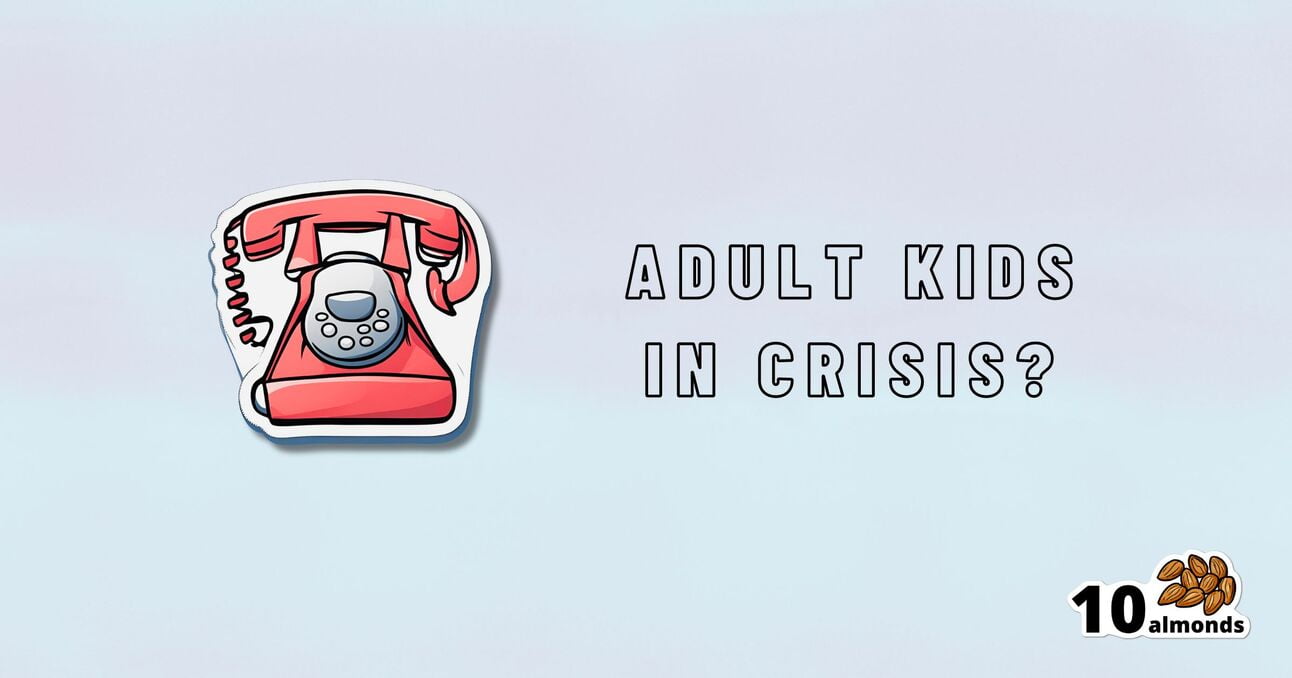If Your Adult Kid Calls In Crisis…
When adult children face crises, learn how to support without smothering and empower them to navigate challenges while preserving your well-being.

Parent(s) To The Rescue?
We’ve written before about the very common (yes, really, it is common) phenomenon of estrangement between parents and adult children:
Family Estrangement & How To Fix It
We’ve also written about the juggling act that can be…
Managing Sibling Relationships In Adult Life
…which includes dealing with such situations as supporting each other through difficult times, while still maintaining healthy boundaries.
But what about when one’s [adult] child is in crisis?
When a parent’s job never ends
Hopefully, we have not been estranged (or worse, bereaved) by our children.
In which case, when crisis hits, we are likely to be amongst the first to whom our children will reach out for support. Naturally, we will want to help. But how can we do that, and where (if applicable) to draw the line?
No “helicopter parenting”
If you’ve not heard the term “helicopter parenting”, it refers to the sort of parents who hover around, waiting to swoop in at a moment’s notice.
This is most often applied to parents of kids of university age and downwards, but it’s worth keeping it in mind at any age.
After all, we do want our kids to be able to solve their own problems if possible!
So, if you’ve ever advised your kid to “take a deep breath and count to 10” (or even if you haven’t), then, consider doing that too, and then…
Listen first!
If your first reaction isn’t to join them in panic, it might be to groan and “oh not again”. But for now, quietly shelve that, and listen to whatever it is.
See also: Active Listening (Without Sounding Like A Furby)
And certainly, do your best to maintain your own calm while listening. Your kid is in all likelihood looking to you to be the rock in the storm, so let’s be that.
Empower them, if you can
Maybe they just needed to vent. If so, the above will probably cover it.
More likely, they need help.
Perhaps they need guidance, from your greater life experience. Sometimes things that can seem like overwhelming challenges to one person, are a thing we dealt with 20 or more years ago (it probably felt overwhelming to us at the time, too, but here we are, the other side of it).
Tip: ask “are you looking for my guidance/advice/etc?” before offering it. Doing so will make it much more likely to be accepted rather than rejected as unsolicited advice.
Chances are, they will take the life-ring offered.
It could be that that’s not what they had in mind, and they’re looking for material support. If so…
When it’s about money or similar
Tip: it’s worth thinking about this sort of thing in advance (now is great, if you have adult kids), and ask yourself nowwhat you’d be prepared to give in that regard, e.g:
- if they need money, how much (if any) are you willing and able to provide?
- if they want/need to come stay with you, how prepared are you for that (including: if they want/need to actually move back in with you for a while, which is increasingly common these days)?
Having these answers in your head ready will make the conversation a lot less difficult in the moment, and will avoid you giving a knee-jerk response you might regret (in either direction).
Have a counteroffer up your sleeve if necessary
Maybe:
- you can’t solve their life problem for them, but you can help them find a therapist (if applicable, for example)
- you can’t solve their money problem for them, but you can help them find a free debt advice service (if applicable, for example)
- you can’t solve their residence problem for them, but you can help them find a service that can help with that (if applicable, for example)
You don’t need to brainstorm now for every option; you’re a parent, not Batman. But it’s a lot easier to think through such hypothetical thought-experiments now, than it will be with your fraught kid on the phone later.
Magic words to remember: “Let’s find a way through this for you”
Don’t forget to look after yourself
Many of us, as parents, will tend to not think twice before sacrificing something for our kid(s). That’s generally laudable, but we must avoid accidentally becoming “the giving tree” who has nothing left for ourself, and that includes our mental energy and our personal peace.
That doesn’t mean that when your kid comes in crisis we say “Shh, stop disturbing my personal peace”, but it does mean that we remember to keep at least some boundaries (also figure out now what they are, too!), and to take care of ourselves too.
The following article was written with a slightly different scenario in mind, but the advice remains just as valid here:
How To Avoid Carer Burnout (Without Dropping Care)
Take care!
Share This Post
Learn To Grow
Sign up for weekly gardening tips, product reviews and discounts.




